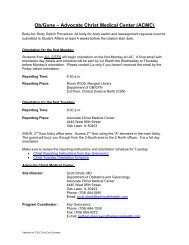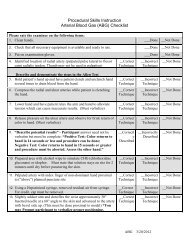a PDF version of the Full Hematology Oncology Curriculum
a PDF version of the Full Hematology Oncology Curriculum
a PDF version of the Full Hematology Oncology Curriculum
You also want an ePaper? Increase the reach of your titles
YUMPU automatically turns print PDFs into web optimized ePapers that Google loves.
Attitudes / Behaviors<br />
Patient Care: fellows must provide patient care that is compassionate, appropriate, and effective for <strong>the</strong><br />
treatment and <strong>the</strong> prevention <strong>of</strong> hematologic and oncologic disease. They must communicate<br />
effectively and demonstrate caring and respectful behaviors when interacting with patients; ga<strong>the</strong>r<br />
accurate information about <strong>the</strong>ir patient; advise diagnostic and <strong>the</strong>rapeutic plans based on patient<br />
information, up‐to‐date scientific evidence, and clinical judgment; use information technology to<br />
support patient care decisions; work with health care pr<strong>of</strong>essionals, including those from o<strong>the</strong>r<br />
disciplines, to provide patient‐focused care<br />
Medical Knowledge: fellows must demonstrate knowledge about basic and clinical sciences in <strong>the</strong> area<br />
<strong>of</strong> hematology/ oncology, and apply this knowledge to patient care.<br />
Practice‐Based Learning and Improvement: fellows must be able to investigate and evaluate <strong>the</strong>ir<br />
patient care practices, appraise and assimilate scientific evidence, and improve <strong>the</strong>ir patient care<br />
practices. They must locate, appraise, and assimilate evidence from scientific studies related to <strong>the</strong>ir<br />
patients’ disease; apply knowledge <strong>of</strong> study designs and statistical methods to <strong>the</strong> appraisal <strong>of</strong> clinical<br />
studies and o<strong>the</strong>r information on diagnostic and <strong>the</strong>rapeutic effectiveness; use information technology<br />
to manage information, access on‐line medical information; and support <strong>the</strong>ir own education; facilitate<br />
<strong>the</strong> learning <strong>of</strong> students and o<strong>the</strong>r health care pr<strong>of</strong>essionals<br />
Interpersonal and Communication Skills: fellows must demonstrate interpersonal and communication<br />
skills that result in effective information exchange especially within <strong>the</strong> team and when acting as<br />
consultants to o<strong>the</strong>r physicians. They need work effectively with o<strong>the</strong>rs as a member and leader <strong>of</strong> <strong>the</strong><br />
hematology/ oncology consultation team.<br />
Pr<strong>of</strong>essionalism: fellows must demonstrate a commitment to carrying out pr<strong>of</strong>essional responsibilities,<br />
adherence to ethical principles, and sensitivity to a diverse patient population. They must demonstrate<br />
respect, compassion, and integrity; a commitment to excellence and on‐going pr<strong>of</strong>essional<br />
development; a commitment to ethical principles; sensitivity and responsiveness to patients’ culture,<br />
age, gender, and disabilities<br />
System‐Based Learning: fellows must demonstrate an awareness <strong>of</strong> and responsiveness to <strong>the</strong> larger<br />
context and system <strong>of</strong> health care and <strong>the</strong> ability to effectively call on system resources to provide care<br />
that is <strong>of</strong> optimal value. They are expected to practice cost‐effective health; advocate for quality patient<br />
care, and assist patients in dealing with system complexities<br />
Resources<br />
14. UIC medical library. http://library.uic.edu/<br />
40



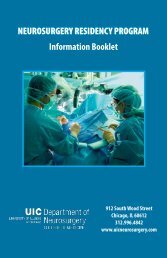
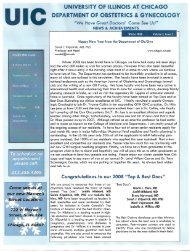
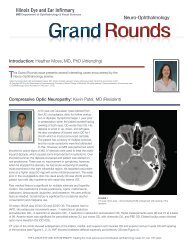
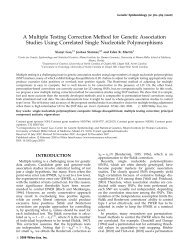
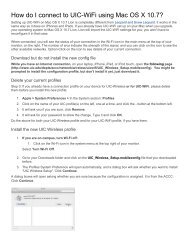
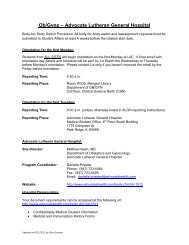
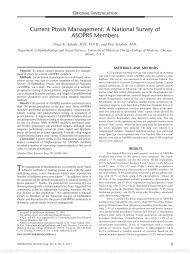
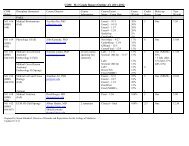
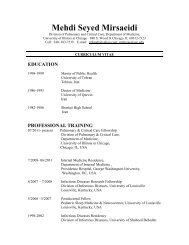
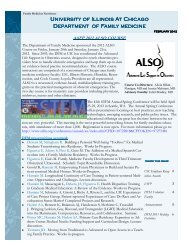
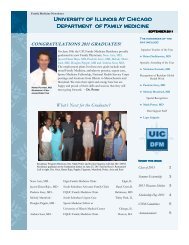
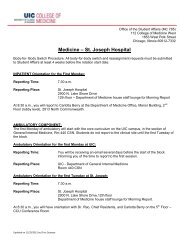
![CV Joan [W51] - University of Illinois College of Medicine at Chicago ...](https://img.yumpu.com/17336863/1/190x245/cv-joan-w51-university-of-illinois-college-of-medicine-at-chicago-.jpg?quality=85)
